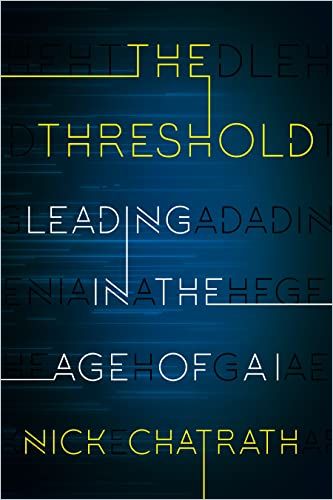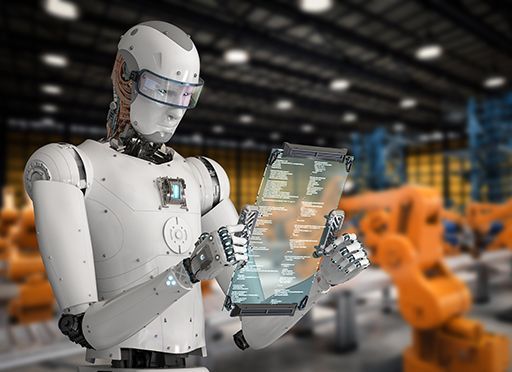Executive coach Nick Chatrath details how to develop your essential humanity to forestall surrendering empathy and compassion to AI.

Threshold Leadership
Executive coach Nick Chatrath, managing director of Artesian Transformational Leadership, urges leaders to consider how they want to think about and react to AI’s huge potential. In 2021 alone, investors put more than $93 billion into artificial intelligence (AI), a year-over-year increase of nearly 40%.
Threshold leadership
Chatrath explains that no current leadership models are adequate for managing the future AI will bring. He warns of the possibility that it could lead humanity into a dystopian nightmare and says the choices leaders make – or fail to make – today will help determine how AI’s story plays out.
AI calls for “threshold” leaders who are willing to grapple with complex issues, who can deepen and leverage their uniquely human traits, and who are decisive, independent thinkers. Traditional leaders can become threshold leaders by “cultivating stillness,” “thinking independently,” “embodying intelligence,” and reaching a more mature state of consciousness.
Four factors are supercharging AI’s growth: exponential advances in computing speed, theoretical breakthroughs, trillions of dollars, and vast amounts of data.
Nick Chatrath
Leaders who practice gratitude and evidence a positive attitude uplift their organizations. That means, for example, that they intentionally provide an “attentive presence” when someone else is speaking to help the speaker cultivate his or her ideas. In turn, when you listen astutely, you may find that the speaker’s message teaches and enriches you. When you pay attention and open yourself up as a human being and a threshold leader, you are exercising nurturing empathy. An AI mechanism that expresses “empathy” or “sympathy” will ring false.
To make the most of their uniquely human intelligence, Chatrath explains, threshold leaders should cultivate “stillness.” They must take time to reflect on their options and feelings, tap into their curiosity and empathy, and consider different, even opposed, perspectives.
Threshold leaders counter biased thinking by soliciting the broadest possible range of opinions in meetings and encouraging independent thinking, which requires people to figure out what they truly believe and to listen alertly to other perspectives. People employeed in a secure corporate culture that encourages independent thinking and allows them to work through their ideas and share them openly with others are more likely to care about outcomes and to intervene when they believe they can help.
Foster Independent Thinking
To stimulate independent thinking, pair people off and have them share their thoughts with one another. Thoughts typically come in “waves,” so when one person stops sharing, he or she should indicate that pause to the other person, who only then may ask a follow-up question. Rounds of follow-up questions continue until the timer rings, and the two participants exchange roles.
Institutions in transition present special challenges. Fostering individual independent thinking supports an organization’s transformation, regardless of its size or habits, and helps it meet its goals.
Instead of directing your team members to follow a predetermined trajectory, trust them as a source of ideas and new perspectives. Take your team off-site and help its members discover what makes them feel their most profound sense of purpose and deepest connection to their true selves.
As AI dominates more work processes, employees may fear for their security and even their value in society. In such moments, psychological safety will matter even more. Nick Chatrath
Chatrath is firmly rooted in the abiding belief that people have – and will always have – emotional intelligence that AI lacks. AI can mimic and identify emotions, but empathy and intuition so far remain elusive.
Limitations on hardware and “algorithmic efficiency” are likely to keep AI from performing emotional and existential work at human levels. Developing consciousness is another barrier to AI achieving emotional intelligence.
Clear thinking requires clear space – literally and figuratively. The author advises cleaning the clutter from your environment and avoiding interruptions. One advantage of AI is that engineers can program it to not interrupt.Meditate on your goals, leadership path, and life trajectory. Consider your intentions while sitting still without noise or distractions. When you take the time to be still, you build your humility and allow yourself to experience your emotions more fully and to think more independently.
Negative events – say, something like having your laptop stolen – occasionally can upset your mental state for days.Apply yourself to work through your annoyance and sense of vulnerability and to re-concentrate your efforts. In such circumstances, be sure to fulfill your obvious physical needs, such as getting sufficient rest.
Embodied Intelligence
Your physicality affects your thinking. Entrepreneurs who boast of getting only an hour of sleep at their desks and managers who demand prompt responses to texts they send in the middle of the night endanger their organizations. Threshold leaders recognize the importance of staying in good physical condition and of helping their teams stay healthy. They manage their energy and take prudent care of themselves.
Three current trends show the need for embodied intelligence: a rising tendency to prize overly rational thinking, increasing pressure to mimic machines, and encroaching techno-humanism.Nick Chatrath
Chatrath cautions that people can become addicted to their devices, and their mental health, creativity, and relationships can suffer as a consequence. AI threatens to disconnect people from their natural physical wisdom. Instead of diving into your device when you have a moment of downtime, cultivate constructive emotions. Sit quietly and think about what really matters to you. Pay attention to how your body feels and the questions that arise while you are quiet.
The “Age of Superintelligence” looms: the future time when AI exceeds human intelligence and masters emotional awareness. If people and machines become “highly integrated,” defining humanness may become more difficult. Leaders must discern and cultivate their true selves to be prepared as AI develops. Those who practice love and wisdom will understand a variety of perspectives and will be able to recognize the forces that can shape – or limit – people’s reactions to and uses of technology.
Human Guidance
Nick Chatrath offers a fascinating alternative to most leadership books that focus on AI. Rather than dwell on how AI will change the workplace and alter leaders’ responsibilities, he instead details how leaders must develop their humanity to cope with new levels of robotic intelligence. Interestingly, he assumes that leaders understand the necessity of embracing their humanity, so he takes up little space trying to convince anybody. Chatrath includes practical exercises and tactics to help executives become “threshold leaders” who leverage their uniquely human traits and boldly lead their teams through the evolving business landscape.










